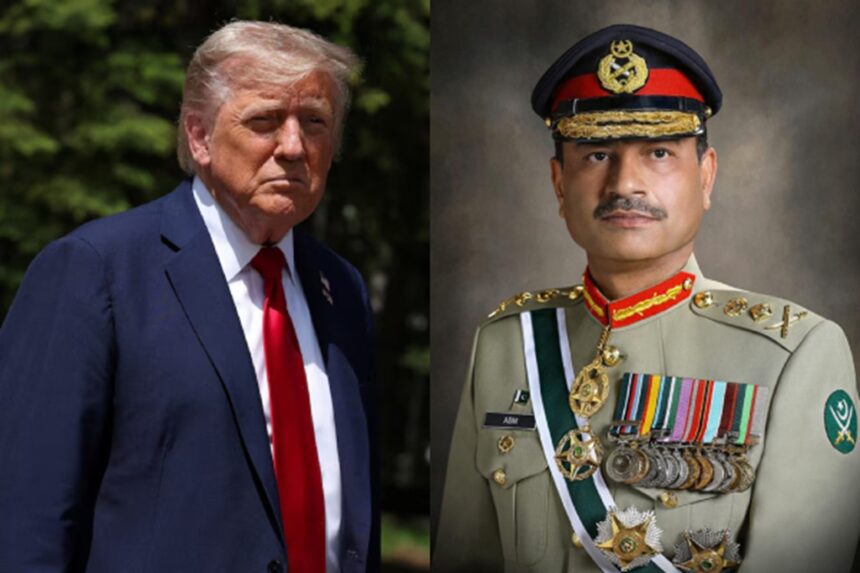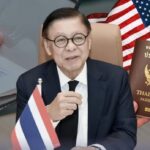WASHINGTON D.C. – U.S. President Donald Trump welcomed Pakistan’s top military leader, Field Marshal Asim Munir, to a White House lunch on Wednesday. The event marked the first time a U.S. president met privately with a Pakistani army chief, without any senior civilian officials present.
News of the meeting, first reported by Reuters, comes shortly after renewed military tension between Pakistan and India. The timing has sparked discussion among diplomats about possible changes in Washington’s approach to Pakistan and the potential impact on its partnership with India.
The lunch in the Cabinet Room was described by White House spokesperson Anna Kelly as recognition for Munir’s help in easing the latest India-Pakistan conflict.
Trump told reporters he was “honoured” to host Field Marshal Munir and credited him for playing a key part in calming the situation on Pakistan’s side. He also praised India’s Prime Minister Narendra Modi’s efforts, saying, “I stopped a war between two major nations,” and pointed to both countries’ nuclear weapons.
US-Pakistan Ties
This meeting signals a possible warming of U.S.-Pakistan ties, which have cooled in recent years. During Trump’s first term and under President Biden, the U.S. shifted its focus to building closer links with India to counter China’s growing presence in the Indo-Pacific.
Pakistan, once a central U.S. ally during the Cold War and after 9/11, saw its influence fade after the U.S. left Afghanistan in 2021. Trump’s meeting with Munir hints at a shift in strategy that could be tied to Pakistan’s location and its role in regional security, especially with ongoing tensions between Israel and Iran.
The recent conflict between India and Pakistan is the backdrop to Trump’s meeting. Violence flared after a 22 April militant attack in Indian-administered Kashmir, which led to the deaths of 26 tourists. India blamed Pakistan and started Operation Sindoor on 7 May, targeting suspected militant sites across the border.
The four-day conflict was the most serious since 1971, involving drones, missiles and jets, with over 70 people killed, mostly in Kashmir. A ceasefire followed on 10 May, with Trump claiming he helped broker the deal. Pakistan supported this view, but India firmly rejected it.
India-Pakistan Conflict
Indian Foreign Secretary Vikram Misri told reporters that the ceasefire resulted from direct talks between the two militaries, at Pakistan’s request. He stressed that India does not accept outside mediation, quoting Modi’s comments to Trump during a 35-minute call.
This difference in accounts shows India’s concern about outside involvement in its disputes with Pakistan, especially over Kashmir, which both sides claim but only partly control.
Trump’s public meeting with Munir risks upsetting India, a key U.S. partner in the Quad group with Japan and Australia.
India has often tried to isolate Pakistan on the world stage, accusing it of supporting terrorism against New Delhi. During Trump’s earlier presidency, the U.S. cut off military aid to Pakistan, siding more closely with India.
The renewed contact with Pakistan’s military leadership and Trump’s claims about mediating the ceasefire have left Indian officials feeling let down, according to experts.
Michael Kugelman, senior fellow at the Asia Pacific Foundation, told Reuters that Indian leaders worry about how much U.S.-Pakistan cooperation they can accept without harming U.S.-India relations.
He warned that Trump’s talk of U.S. mediation and offers to resolve the Kashmir question could raise tensions with India, which sees these issues as strictly between India and Pakistan.
The visit from Munir comes as Pakistan’s government voices support for Iran in its conflict with Israel, raising new questions in Washington. Some analysts think Trump’s invitation to Munir may be an effort to gain Pakistani cooperation, possibly including the use of airbases for any U.S. operations against Iran.
This could have unexpected effects, since Iran may move closer to India if Pakistan strengthens ties with the U.S., according to West Asia analyst Kabir Taneja.
On social media, the Trump-Munir meeting sparked strong views. Pakistani users, such as @Dr_AyeshaNavid, praised the event as a diplomatic win and said it countered India’s claims about Pakistan and terrorism.
On the other hand, Indian voices like @HarmeetKKaur saw the meeting as a diplomatic setback for India after the Pahalgam attack. These reactions show how the meeting is shaping public opinion in both countries.














